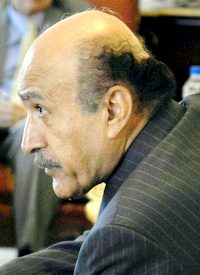
The groups present at the meeting represented a wide array of opposition sectors, ranging from the youthful revolutionaries following democracy advocate Mohamed ElBaradei to members of the outlawed Muslim Brotherhood.
The Associated Press reports:
Vice President Omar Suleiman endorsed a plan with the opposition to set up a committee of judiciary and political figures to study proposed constitutional amendments that would allow more candidates to run for president and impose term limits on the presidency, the state news agency reported. The committee was given until the first week of March to finish the tasks.
The Egyptian government also agreed not to harass any of the government protesters, infringe upon freedom of the press, or interfere with the Internet and text messaging in the future.
One concession that Mubarak refused to make was to was to step down immediately, as demanded by the Muslim Brotherhood. Brotherhood spokesman Mohammed Morsey commented, “The people want the president and his regime to step down immediately. We’re in the field, and we’re in the dialogue. There’s no contradiction.”
Instead, the Egyptian government agreed to unspecified political reforms, as well as these reforms described by The Blaze:
The two sides also agreed at the meeting that the government would field complaints about political prisoners, according to the state news agency.
The government also pledged to commission judicial authorities to fight corruption and prosecute those behind it. It agreed to investigate and prosecute those responsible for the yet unexplained disappearance of police from Cairo’s streets more than a week ago, which unleashed a wave of lawless rooting and arson.
College News reports that the Vice President also agreed to a committee composed of judiciary and political figures to "'study proposed constitutional reforms that would allow more candidates to run for president and impose term limits on the presidency.’ The committee would have until the end of the month to complete the study."
According to the Human Rights Watch, nearly 300 people have been killed since the start of the riots in Egypt two weeks ago. After days of violent clashes between revolutionary groups and the police, Egypt is finally beginning to return to relative normalcy.
The Los Angeles Times notes,
Banks were open for limited hours along with many shops. The stock market announced it would reopen on Sunday, though schools were still shut for the mid-year holiday. Traffic was returning to ordinary levels in many places and the start of the nighttime curfew was relaxed to 8 p.m.
Protest organizer ElBaradei Mostafa al-Naggar indicates, however, that all is not yet well:
The protest continues because there are no guarantees and not all demands have been met. We did not sign on to the statement. This is a beginning of a dialogue. We approve the positive things in the statement but…we are still demanding that the president step down.
Photo: Egyptian Vice President Omar Suleiman




